
Gordon Meredith Lightfoot Jr. was a Canadian singer-songwriter and guitarist who achieved international success in folk, folk-rock, and country music. He is credited with helping to define the folk-pop sound of the 1960s and 1970s. He has been referred to as Canada's greatest songwriter and his songs have been recorded by some of the world's most renowned musical artists. Lightfoot's biographer Nicholas Jennings said, "His name is synonymous with timeless songs about trains and shipwrecks, rivers and highways, lovers and loneliness."
John Coburn Stewart was an American songwriter and singer. He is known for his contributions to the American folk music movement of the 1960s while with the Kingston Trio (1961–1967) and as a popular music songwriter of the Monkees' No. 1 hit "Daydream Believer" and his own No. 5 hit "Gold" during a solo career spanning 40 years that included almost four dozen albums and more than 600 recorded songs.

Roger Henry Brough Whittaker was a Kenyan-born British singer-songwriter and musician. His music is an eclectic mix of folk music and popular songs, the latter variously in a crooning or in a schlager style. He is best known for his baritone singing voice and trademark whistling ability as well as his guitar skills.
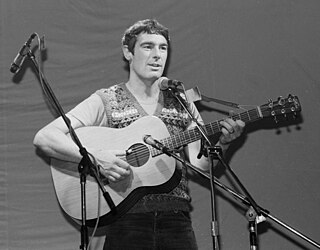
Nic Jones is an English singer, songwriter and musician. Regarded as a prominent figure of the British folk revival, he has recorded five solo albums and collaborated with various musicians.

Colin Kendall Linden is a Canadian guitarist, songwriter and record producer. Linden plays acoustic and electric guitar, specializing in slide guitar, country blues, and ragtime fingerpicking, who frequently collaborates with country and folk performers.
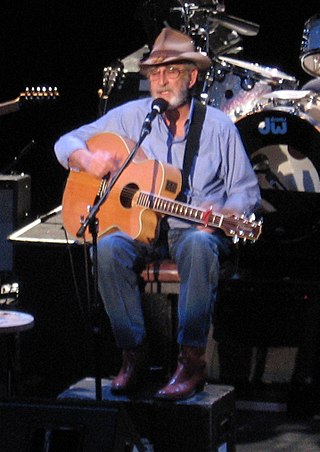
Donald Ray Williams was an American country music singer, songwriter, and 2010 inductee into the Country Music Hall of Fame. He began his solo career in 1971, singing popular ballads and amassing seventeen number one country hits. His straightforward yet smooth bass-baritone voice, soft tones, and imposing build earned him the nickname "The Gentle Giant". In 1975, Williams starred in a movie with Burt Reynolds and Jerry Reed called W.W. and the Dixie Dancekings.
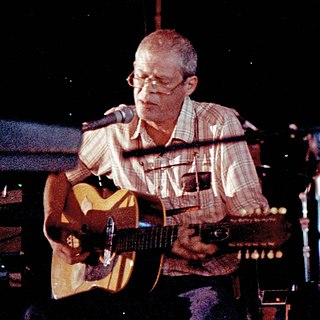
"Spider" John Koerner is an American guitarist, singer, and songwriter. He is best known as a guitarist and vocalist in the blues trio Koerner, Ray & Glover, with Dave Ray and Tony Glover. He has also made albums as a solo performer and with Willie Murphy.

Harvey Brooks is an American bass guitarist.
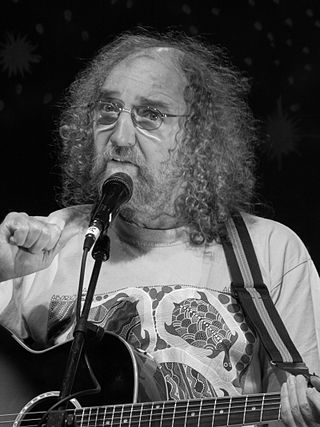
Vincent Paul Garbutt was an English folk singer and songwriter. A significant part of his repertoire consisted of protest songs covering topics such as "the Troubles" in Northern Ireland, unemployment, and social issues. Whilst the subject of his songs featured many political and social topics, Garbutt's on stage wit, humour and storytelling between songs became a hit with audiences and for which he became widely known. He would wish his audiences "All the very best" along with, "I'm knackered now, aren't you?"

Samuel Robert Gibson was an American folk singer and a key figure in the folk music revival in the late 1950s and early 1960s. His principal instruments were banjo and 12-string guitar.

Crispian St. Peters was an English pop singer-songwriter, best known for his work in the 1960s, particularly hit songs written by duo The Changin' Times, including "The Pied Piper", and Ian & Sylvia's "You Were on My Mind". His popularity waned after he claimed he was a better performer than other well known singers and declared that he was a better songwriter than the Beatles.

Hal Michael Ketchum was an American country music singer and songwriter. He released eleven studio albums from 1986 to 2014, including nine for divisions of Curb Records. Ketchum's 1991 album Past the Point of Rescue was his most commercially successful, having been certified gold by the Recording Industry Association of America. Between 1991 and 2006, Ketchum had 17 entries on the Billboard Hot Country Songs charts, including three that reached No. 2, "Small Town Saturday Night", "Past the Point of Rescue", and "Hearts Are Gonna Roll". Ketchum's music is defined by his songwriting and folk music influences. Ketchum retired from the music business in 2019 following a diagnosis of dementia.

Kenneth Stephen Nicol is an English guitar player, vocalist and songwriter. He was a member of The Albion Band for many years, and for eight years (2002–2010) played in British folk rock band Steeleye Span.
Paul Evans is an American rock and roll singer and songwriter, who was most prominent in the 1950s and 1960s. As a performer, he had hits with the songs "Seven Little Girls Sitting in the Backseat", reaching No. 9 on the Billboard Hot 100 in 1959), "Midnight Special" and "Happy-Go-Lucky Me".

Jimmy LaFave was an American singer-songwriter and folk musician. After moving to Stillwater, Oklahoma, LaFave became a supporter of Woody Guthrie. He later became an Advisory Board member and regular performer at the annual Woody Guthrie Folk Festival.

"Everybody's Talkin' (Echoes)" is a song written and recorded by American singer-songwriter Fred Neil in 1966 and released two years later. A version of the song performed by American singer-songwriter Harry Nilsson became a hit in 1969, reaching No. 6 on the Billboard Hot 100 chart and winning a Grammy Award after it was featured in the film Midnight Cowboy. The song, which describes the singer's desire to retreat from the harshness of the city to a more peaceful place and an easier life, is among the most famous works of both artists, and has been covered by many other notable performers.

Penguin Eggs is the fifth and final studio album by English folk musician and singer Nic Jones, released by Topic Records in 1980. After establishing himself as a sought after figure on the British folk revival scene, Jones recorded Penguin Eggs with producer Tony Engle; it consists largely of traditional folk songs arranged by Jones, but also includes three contemporary tracks by other writers. Exemplified throughout the album is Jones' intricate acoustic guitar playing style, characterised by a distinctive, percussive plucking style and use of open tunings. He also plays fiddle on one song, while he is joined on many tracks by Tony Hall on melodeon and Bridget Danby on recorder.
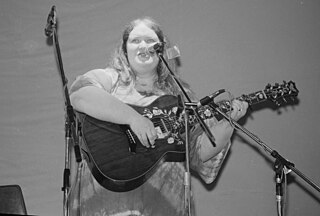
Rosemary "Rosie" Hardman is a British folk singer-songwriter, musician and performer, best known for such recordings as Lady For Today, Pride of the River, Song to the Evening Sky, and Tongue Tied. Hardman was one of the mainstays of the Manchester folk scene in the 1960s, and performed extensively in both the UK and internationally until 1991.

Steve Frank Ashley is an English singer-songwriter, recording artist, multi-instrumentalist, writer and graphic designer. Ashley is best known as a songwriter and first gained public recognition for his work with his debut solo album, Stroll On. Taking his inspiration from English traditional songs, Ashley has developed a songwriting style which is contemporary in content while reflecting traditional influences in his melodies, poetry and vocal delivery.
Mike Silver is a British singer-songwriter, who has been active in the UK contemporary and folk music circuits since the late 1960s.



















